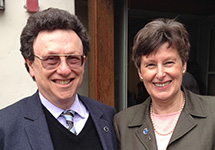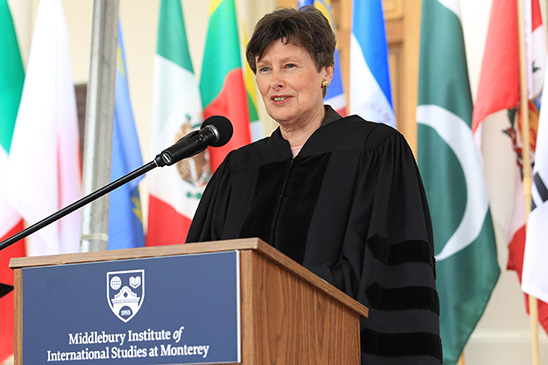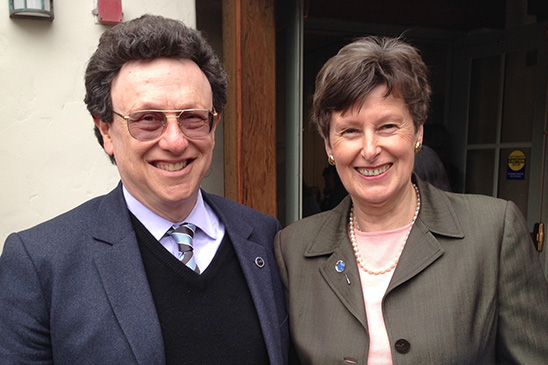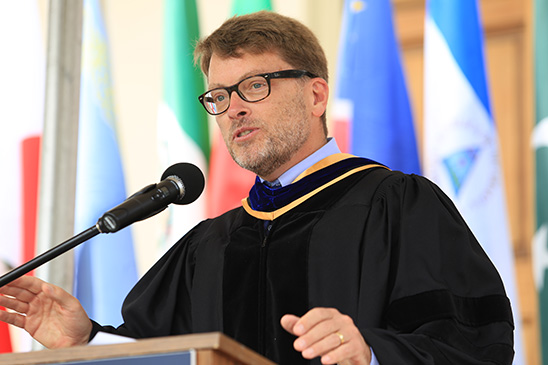May 19, 2015

CNS Director William Potter with UN High Representative for Disarmament Affairs Angela Kane
At the Middlebury Institute of International Studies at Monterey Spring 2015 Commencement Ceremony, United Nations High Representative for Disarmament Affairs Angela Kane received an Honorary Doctorate Degree of Humane Letters for her tireless efforts to promote disarmament and nonproliferation.
The presentation of the honorary degree to Ms. Kane followed the welcome remarks by Dr. Jeff Dayton-Johnson, vice president of academic affairs and dean of the Institute. In his remarks, Dr. Dayton-Johnson lauded the James Martin Center for Nonproliferation Studies, which recently marked its twenty-fifth anniversary. Beyond the Center’s renowned analysis and research on critical global challenges such as those posed by North Korea’s nuclear program, Syria’s chemical weapon disarmament, and the Iranian nuclear deal, he noted particular appreciation for and pride in CNS’s dedication to training the next generation of nonproliferation professionals, an undertaking that “may have the most lasting impact,” and which “lies at the core” of the Center’s mission. He went on to assert that, “It’s not an exaggeration at all to imagine that some of the nonproliferation and terrorism studies graduates who are about to cross this stage may end up playing significant roles in the implementation of the nuclear agreement with Iran. In fact, its likely.”
In her commencement speech, “Education and Public Service,” Ms. Kane delivered a forceful argument for education as the key to overcoming the global challenges and contradictions posed by our current international system, manifesting, for example, as gaps between global norms and national implementation. She pointed to the Nuclear Non-Proliferation Treaty as a “classic example” of the “mismatch between lofty global norms and parochial national actions that are inconsistent with those norms.” She insisted, however, that the incongruity of our ideals and our reality should not dissuade us, but rather motivate us, and toward this end, she expressed profound appreciation for the work of MIIS and CNS in their devotion “to disarmament and nonproliferation not just as research subjects, but as professions.” Ms. Kane expressed her conviction that MIIS graduates “will surely encounter at some point opportunities to contribute all you can to doing exactly that: to bridge these gaps, to harmonize the relationship between international norms and domestic laws, policies, and institutions.”
Ms. Kane also expressed deep respect for Middlebury’s historic emphasis on “the importance of learning foreign languages, another indispensable skill needed for confronting the many challenges of globalization.” As a polyglot who speaks five languages fluently, as well as having studied four others deeply, Ms. Kane acknowledged that “learning a language means not only learning words and phrases, but absorbing a new culture—a new way of looking at the world—and with it, an appreciation of the environment others live in.”
In conclusion, Ms. Kane offered the same advice to MIIS graduates as Dr. Wangari Maathi offered to young people everywhere upon her acceptance of the 2004 Nobel Peace Prize: “Those of us who have been privileged to receive education skill, and experiences and even power must be role models for the next generation of leadership.”

Angela Kane, UN High Representative for Disarmament Affairs

CNS Director William Potter with UN High Representative for Disarmament Affairs Angela Kane

Dr. Jeff Dayton-Johnson, Vice President of Academic Affairs and Dean of MIIS
